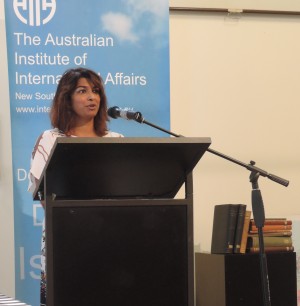Indian Foreign Policy under Modi: A Shift in Approach?
On 17 March at Glover Cottages, Dr Lavina Lee, a lecturer in the Department of Modern History, Politics and International Relations at Macquarie University, explored prime minister Modi’s possible foreign policy objectives and options. Modi had come to office at the federal level with a mixed reputation as chief minister of Gujerat. There he had been accused of deliberately failing to stop religious riots in 2002, but had demonstrated an acute ability for economic management. Now, not yet a year in office at the federal level, he was demonstrating an intelligent grasp of foreign policy issues. The dynamics remained as before his prime ministership – maintenance of India’s traditional ties with the Russian Federation and a well-founded wariness of Chinese territorial claims. But Modi was confidently deepening the more recent trend in India’s perspective on the world by embracing as far as was feasible multiple alliances, particularly with the United States, Japan, Australia and the countries of ASEAN. His first visit outside South Asia as PM was to Japan, where he already enjoys a close personal relationship with PM Shinzo Abe. Abe significantly expanded Japan’s commitment to investment in the development of India, and it was agreed that Japan’s inclusion in the Malabar naval exercise in 2014, traditionally an annual US-Indian naval exercise, should become more regular.
Lavina observed however that India’s relations with the US are not altogether plain sailing: there is reticence in Washington in sharing technology, particularly sensitive technology, with a country that still relies extensively on Russian arms systems. Japan has similar reservations about getting too deeply involved in the Indian civil nuclear program because of India’s desires to re-process spent fuel. Whilst the US and India recently announced a break-through on the issue of civil liability for nuclear accidents, which has deterred US firms from entering the Indian market, the diversion of main liability to nuclear operators rather than suppliers has been criticised for capping liability at seriously inadequate levels. Nevertheless, Lavina thought that none of this would deter Modi’s steady incremental approach to diversifying the country’s foreign relations. India will become more and more multi-aligned while seeking to preserve its strategic autonomy. Meanwhile, in economic terms, Modi was preparing the ground for greater foreign participation. He had abandoned the Central Planning Commission, increased allowable foreign investment in insurance and defence industries, and plans to introduce a national GST to tackle rampant tax evasion, and to allow complete foreign ownership of Indian railways.
Summary by Richard Broinowski
for a snapshot of Dr Lavina Lee talking about India’s foreign policy interests, please go to:
